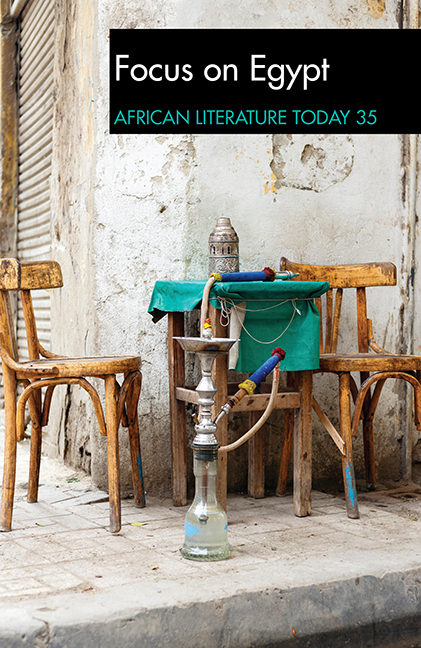Book contents
- Frontmatter
- Dedication
- Contents
- Notes on Contributors
- Foreword
- EDITORIAL ARTICLE
- ARTICLES
- Coping with a Failed Revolution: Basma Abdel Aziz, Nael Eltoukhy, Mohammed Rabie & Yasmine El Rashidi
- The Complications of Reading Egypt as Africa: Translation & Magdy el-Shafee's مترو (Metro)
- Narratives of the ‘Nubian Awakening’: Reclaiming Egypt's African Identity
- Frantz Fanon's Conceptualization of Decolonization in Sonallah Ibrahim's The Committee
- Romance as Epistemological Aesthetic in the Fiction of Ahdaf Soueif
- Literature as Prophecy: Re-Reading Yusuf Idris's The Cheapest Nights
- Travel & Discovery: Hopes for a New Egypt in Mohamed Salmawy's Butterfly Wings
- The Symbolic Relevance of the Use of the Eye in Nawal El Saadawi's Two Women in One & God Dies by the Nile
- African Epics: A Comparative Study of Sundiata & Al-Sirah al-Hilaliyyah
- Conversations with Nawal El Saadawi: Online interview
- FEATURED ARTICLES
- LITERARY SUPPLEMENT
- TRIBUTE
- REVIEWS
- Reviews of Nigerian Poetry
Narratives of the ‘Nubian Awakening’: Reclaiming Egypt'sAfrican Identity
from ARTICLES
Published online by Cambridge University Press: 24 August 2019
- Frontmatter
- Dedication
- Contents
- Notes on Contributors
- Foreword
- EDITORIAL ARTICLE
- ARTICLES
- Coping with a Failed Revolution: Basma Abdel Aziz, Nael Eltoukhy, Mohammed Rabie & Yasmine El Rashidi
- The Complications of Reading Egypt as Africa: Translation & Magdy el-Shafee's مترو (Metro)
- Narratives of the ‘Nubian Awakening’: Reclaiming Egypt's African Identity
- Frantz Fanon's Conceptualization of Decolonization in Sonallah Ibrahim's The Committee
- Romance as Epistemological Aesthetic in the Fiction of Ahdaf Soueif
- Literature as Prophecy: Re-Reading Yusuf Idris's The Cheapest Nights
- Travel & Discovery: Hopes for a New Egypt in Mohamed Salmawy's Butterfly Wings
- The Symbolic Relevance of the Use of the Eye in Nawal El Saadawi's Two Women in One & God Dies by the Nile
- African Epics: A Comparative Study of Sundiata & Al-Sirah al-Hilaliyyah
- Conversations with Nawal El Saadawi: Online interview
- FEATURED ARTICLES
- LITERARY SUPPLEMENT
- TRIBUTE
- REVIEWS
- Reviews of Nigerian Poetry
Summary
Since the late1980s, authors associated with the revivalist cultural andpolitical movement known as the ṢaḥwaNubiyya or ‘Nubian Awakening’ have created anew and hybrid form of Egyptian literary expression.Inspired by Nubia's distinct language, culture, history,mythology and geography, their writing makes legible adistinctively Nubian subjectivity that plays a mediatingrole in countering the ‘layered invisibility’ (NixonSlow Violence and the Environmentalism of thePoor: 16) of the Nubian people in postcolonialEgypt after they were forcibly displaced from their homelandto make way for the Aswan High Dam in 1964. TakingNights of Musk: Stories from Old Nubia(Layāli al-Misk al-‘Atiqa), acollection of short stories by the prominent Nubian writerand activist Haggag Hassan Oddoul as a case study, thispaper argues that Nubian literature contests the unitaryfiction of Egypt's Arab identity postulated during theheyday of Arab nationalism by highlighting the nation'smarginalized African identity. As such, it can be seen aspart of a broader trend in modern Egyptian writing known as‘border literature’ which seeks to integrate regional andminority subjectivities into Egypt's national imaginary(El-Refaei ‘Egypt's Borders and the Crisis of Identity inthe Literature of Nubia and Sinai’).
In 1964 thebuilding of the Aswan High Dam forcibly displaced some fiftythousand Egyptian Nubians from their ancient homeland to thearea of Kom Ombo, around seventy kilometres north of Aswan(Dafalla The Nubian Exodus; FahimDams, People and Development). All thatremained of Nubia, a land traditionally falling along theNile between the first and sixth cataracts south of Aswanand north of Khartoum, was submerged under the dam'sreservoir which became known as Lake Nasser – a ‘potentsymbol of postcolonial power etched onto the landscape’(Dimeo ‘Unimaginable Community’: 80). The High Dam'sredemptive symbolism as a reflection of the power,prosperity and progress of the postcolonial state provedhighly popular amongst the Egyptian public who, in 1964,flocked en masse to the parliament crying‘Nasser, Nasser, we come to salute you: after the Dam ourland will be paradise!’ (Nixon: 116). However, this supportwas accompanied by a willed amnesia at national level aboutits long-term impact on Nubian culture and society, such asongoing injustices surrounding compensation for lost landand property; non-recognition of the Nubians as a nationalminority by the state; and the denial of cultural andlinguistic rights.
- Type
- Chapter
- Information
- ALT 35: Focus on EgyptAfrican Literature Today 35, pp. 39 - 57Publisher: Boydell & BrewerPrint publication year: 2017

